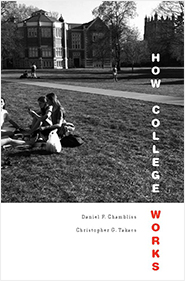
How College Works, a book co-authored by the Eugene M. Tobin Distinguished Professor of Sociology Daniel Chambliss, continues to receive attention in the national media, this time as a Chronicle of Higher Education “Book Club” selection. Chambliss, along with his co-author and former student Christopher Takacs ’05, will initiate discussions of the book’s chapters by supplying weekly entries on the publication’s site for six weeks. They will also be tweeting with the hashtag #ChronBooks.
The Chronicle’s article announcing the book’s selection, "Read About How You Can Make College Better," described the book as being “about small changes professors, administrators, and institutions can make to dramatically improve the student experience.” The online blog and related social media are scheduled to appear from Aug. 25 through Sept. 29. The authors have already posted introductory entries. Readers may comment via the Twitter hashtag in 140 characters or in the comment area of the Chronicle site in 150 words.
In addition to the authors, the Chronicle has invited five participants to contribute to the Twitter discussion. They are Rebecca Chopp, chancellor of the University of Denver; Bryon Grigsby, president of Moravian College; Allen Groves, dean of students at the University of Virginia; Donal O’Shea, president of New College of Florida; and Adam Weinberg, president of Denison University.
How College Works was released by Harvard University Press (HUP) in March, but the study’s results have received significant attention from the national education media in the last few years. Most recently Chambliss was interviewed by The New York Times and Inside Higher Ed published two of his opinion pieces related to the book.
According to HUP, How College Works reveals the surprisingly decisive role that personal relationships play in” determining a student’s collegiate success, and puts forward a set of small, inexpensive interventions that yield substantial improvements in educational outcomes. …the authors followed a cluster of nearly one hundred students over a span of eight years. The curricular and technological innovations beloved by administrators mattered much less than the professors and peers whom students met, especially early on. … Great teachers were more important than the topics studied, and even a small number of good friendships—two or three—made a significant difference academically as well as socially.
“For most students, college works best when it provides the daily motivation to learn, not just access to information. Improving higher education means focusing on the quality of a student’s relationships with mentors and classmates, for when students form the right bonds, they make the most of their education.”
As explained on the College’s website dedicated to The Mellon Project for the Assessment of the Liberal Arts, “Since 1999, with major funding support from the Andrew W. Mellon Foundation, Hamilton College has undertaken a series of research initiatives in the assessment of liberal arts education. … Chambliss has headed up the project since its inception. Some of the reports are topical, addressing specific issues in the student educational experience. Others are comprehensive, covering the range of what we learned about students' experience in college, given in chronological order from the first year through the senior year. Still others are policy reports consisting of recommendations for faculty and academic readers, based on our findings.
“In 2001, as a central component of the Mellon Assessment Project, a panel of 100 students was randomly selected from the incoming Class of 2005. Student interviewers interviewed panel members, throughout their college careers and for two years afterwards, on subjects of dorm life, friends, relationships, advising, classes, majors, professors, activities, junior year abroad, sports, and a wide range of other topics. A total of 340 interviews have been collected, transcribed, and analyzed.” It is on this component of the Mellon study that How College Works focuses.
Posted August 19, 2014
